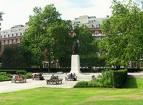Joseph Hands 1816 - 1865
October 09, 2008
 **Joseph Hands
**MRCS
1816? - 1865? was a British orthodox physician who converted to
homeopathy, to become a member of the Medical Council of the Hahnemann
Hospital at 39 Bloomsbury
Square
and a member of the Hahnemann Medical
Society.
**Joseph Hands
**MRCS
1816? - 1865? was a British orthodox physician who converted to
homeopathy, to become a member of the Medical Council of the Hahnemann
Hospital at 39 Bloomsbury
Square
and a member of the Hahnemann Medical
Society.
Joseph Hands practiced at 80 Grove, Hammersmith and 23 Duke Street in Grosvenor Square.
Joseph Hands knew the Staff of the Hahnemann Hospital at 39 Bloomsbury Square which included John Anderson, James Chapman, Edward Charles Chepmell, Paul Francois Curie, Robert Ellis Dudgeon, Thomas Engall, Amos Henriques, Robert Hamilton, Charles Hunt, Henry Kelsall, Joseph Laurie, Henry Victor Malan, James John Garth Wilkinson, David Wilson, George Wyld, William Leaf, Christian Karl Josias Bunsen, Thomas Egerton 2nd Earl of Wilton, Robert Grosvenor, Thomas Roupell Everest, Charles Powell Leslie, James More Molyneux, David Wilson, William Henry Ashurst, William Thomas Berger, W A Case, J M Douglas, G H Flatcher, John Fowler, Joseph Glover, Sydney Hanson, Thomas Higgs, T H Johnstone, John Miller, Chas Pasley, Mathias Roth, Frederick Sandoz, W Stephenson, Samuel Sugden, Allan Templeton, Major Tyndale, William Warne, A Wilkinson, S Wilson and many others.
On 22.1.1852, The Homeopathic Times records a schism in the Hahnemann Hospital, caused by an advertisement placed for Clinical lecturers in the local newspapers, and the appointment of Paul Francois Curie andAmos Henriques.
These appointments led to the resignation of John Chapman, Edward Charles Chepmell, Joseph Hands and David Wilson. The grounds for contention were that the Hahnemann Hospital was founded to eliminate medical cliques, and to promote medical equality. It was felt that by awarding Paul Francois Curie andAmos Henriques the title of Clinical Lecturer and Professor, this rule was breached.
The Association for the Protection of Homeopathic Practitioners and Students had just been founded in 1851, and its members included George Atkin, Francis Black, John Chapman, Paul Francois Curie, John James Drysdale, Robert Ellis Dudgeon, George Fearon, Edward Hamilton, William Hering, C. B. Kerr, Joseph Laurie, John Ozanne, John Rutherford Russell, David Wilson and many others.
John Chapman, Edward Charles Chepmell, Joseph Hands and David Wilson felt strongly enough about the issue of medical cliques and elitism to resign, but the overwhelming feeling of the rest of the staff was in full support of these principles. Apparently, there had been some ill feeling inherited from the earlier establishment under William Leaf, and as Paul Francois Curie andAmos Henriques were not prepared to abandon their titles as Clinical lecturers, a schism occurred.
Joseph Hands wrote Will-ability; Or, Mind and Its Varied Conditions and Capacities, New views of matter, life, motion, and resistance, A Dissertation on Diets and Digestion, Homeopathy and Other Modern Systems Contrasted with Allopathy, Beauty and the laws governing its development, Vaccination Viewed as a Sanitary Measure with Modes and Facts for Establishing Its Future Permanent Efficiency: Being an Address to the Opponents of this Small-pox Preventive Process.
Of interest:
**Decimus Hands **1805 - 1872 (Anon, The Monthly Homeopathic Review, Obituary of Decimus Hands, (1872). Page 715. And Anon, The Homeopathic Medical Directory of Great Britain and Ireland, and Annual Abstract of British and American Homeopathic Serial Literature, Obituary of Decimus Hands, (1873). Page 351), MRCS England 1835, LSA London 1836 (Anon, Homeopathic Directory of Great Britain and Ireland,(1868). Page 44), MRCSE Homeopath practiced at 9 Dorset Square and also at his home at Moss Villa, 5 New Finchley Road, and he was a member of the Hahnemann Medical Society in 1853.
Decimus Hands was a close friend of James John Garth Wilkinson, and in 1861, they travelled together to Spain with *James Outram 1st Baronet 1803 – 1863 (Clement John Wilkinson, James John Garth Wilkinson; A Memoir of His Life, with a Selection of His Letters. (Kegan Paul, Trench, Trubner & Co, 1911). Page 42).
- James Outram 1st Baronet 1803 – 1863 was an English general who fought in the Indian Rebellion of 1857, and is considered a British hero. ‘…In February 1858 he received the special thanks of both houses of Parliament, and in the same year the dignity of baronet with an annuity of £1000. When, on account of shattered health, he returned finally to England in 1860, a movement was set on foot to mark the sense entertained, not only of his military achievements, but of his constant exertions on behalf of the natives of India, whose weal [sic], in his own words, he made his first object. The movement resulted in the presentation of a public testimonial and the erection of statues in London (by sculptor Matthew Noble) and Calcutta. He died on the 11 March 1863, and was buried in the nave of Westminster Abbey, where the marble slab on his grave bears the poignant epitaph The Bayard of India…. ‘See http://en.wikipedia.org/wiki/Sir\_James\_Outram,\_1st\_Baronet